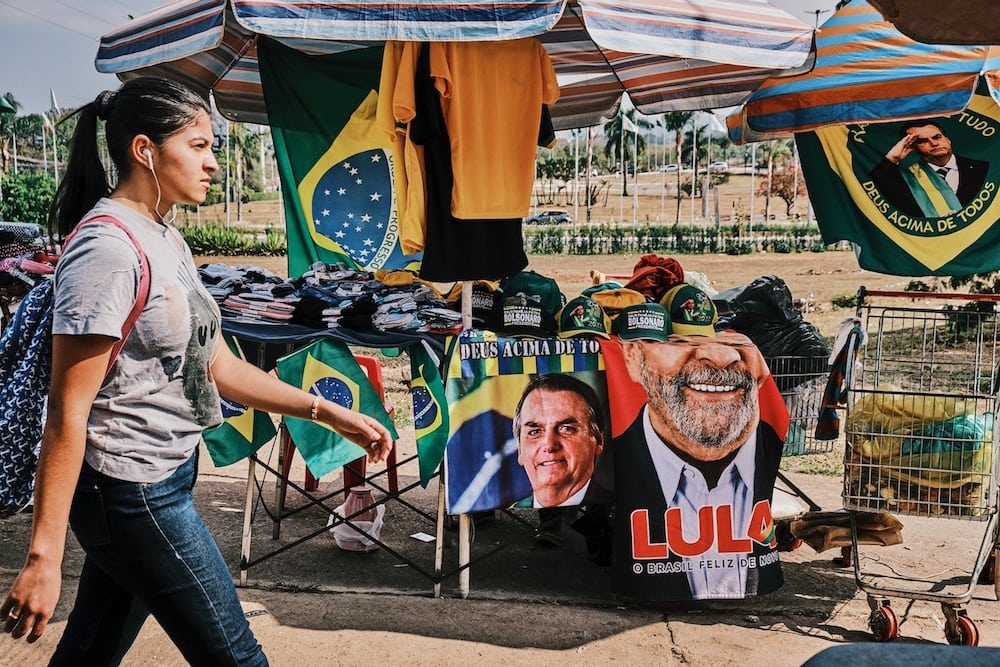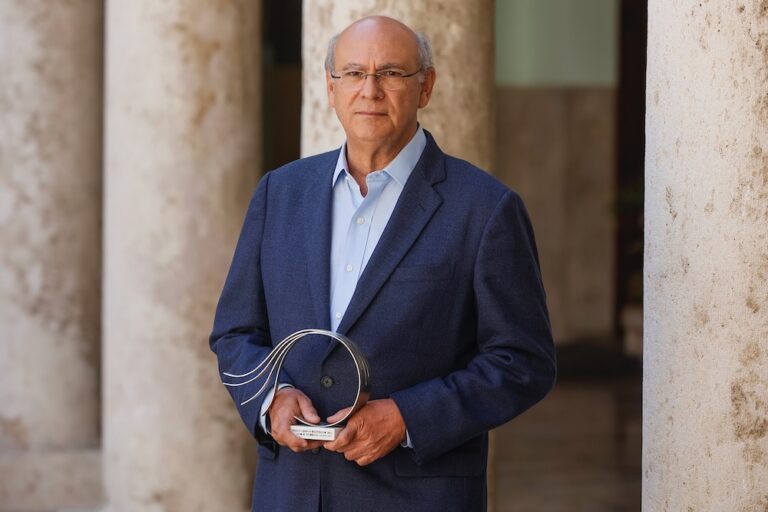Special International Day to End Impunity Issue: Laura Vidal's latest Americas brief shines a light on the intersections between impunity, journalists' safety and elections, based on IFEX member reports and news from the region.
Amidst political upheaval and electoral turbulence, Latin American journalists confront a surge of aggression, underscoring the fragility of press freedom in times of elections. As people went to the polls in Colombia, Ecuador, and Argentina, a worrying number of incidents revealed systemic violence against media professionals, especially women. In response, strategies from journalistic and human rights organisations are emerging, advocating for enhanced protective measures and legal reforms, crucial for safeguarding press workers.
As the world observes the International Day to End Impunity for Crimes against Journalists on 2 November, a critical focus should be placed on the intrinsic link between the impunity enjoyed by perpetrators of these crimes and the safety of journalists. For most of those whose questionable actions are at risk of being exposed by the press the message is clear: any act can be undertaken without fear of retribution. To complicate matters further, the stakes are significantly higher during electoral periods.
Members of the journalistic community, including members of the IFEX network, have noted that the onset of elections often leads to a time of heightened violence against them. Regrettably, but not surprisingly, perpetrators are rarely being held accountable for election-time assaults on journalists. This impunity isn’t limited to physical attacks; it extends to stigmatisation efforts as well. It has become an unwelcome expectation that political candidates and officials will attempt to discredit press work as part of their electoral strategy.
Despite the American Convention on Human Rights recognising freedom of expression as a cornerstone of democracy in the Americas, the reality on the ground shifts alarmingly when electoral processes intersect with information dissemination. This discrepancy has profoundly adverse effects on the electorate’s decision-making process. Indeed, the way in which political candidates engage with and refer to the press during election campaigns is often a precursor to their approach to media and free speech during their subsequent term in office.
Elections transform the already intense and perilous task of journalistic reporting into something even more fraught with risk, and this context of violence becomes even more heightened in rural or remote areas. Colombia is an important example of this complexity given the violence brought by the armed conflict, which translates into illegal groups tightly controlling where people can and cannot go.
Elections and press freedom: Tensions in Ecuador, Argentina, Colombia and Venezuela
The role of the press in maintaining democratic processes is never more evident than during electoral periods, a time when the accuracy and immediacy of information is paramount. However, events in Ecuador, Argentina, and Colombia this year have showcased how electoral contexts can exacerbate threats against journalists and undermine their crucial role in democratic societies. As these threats go uninvestigated and unpunished, it is clear that with every electoral period violence will make its appearance.
In Ecuador, the landscape for press freedom during this year’s elections was particularly alarming. The anticipated polls seemed to intensify existing vulnerabilities for journalists, marked by a surge in misinformation campaigns. According to Fundamedios, the electoral period was marred by violence, with 46 aggression victims recorded, encompassing candidates, journalists, and other media workers. The organisation’s tracking indicates an unsettling trend, noting 3,515 attacks on freedom of expression from 2007 to June 2023, with 22 attacks reported in June 2023 alone.
Colombia’s regional elections similarly painted a grim picture. Reports from the Electoral Observation Mission disclosed 179 incidents against candidates in the election year, up to September 29. This figure represents a 37.7% increase from the previous regional elections in 2019. Moreover, the uptick wasn’t limited to candidates alone; journalists covering the elections also encountered violent actions. FLIP highlighted these events’ detrimental impact on press freedom and democracy, suggesting that persistent intimidation from various quarters, including politicians and armed groups, has led journalists into self-censorship, refraining from covering significant public interest issues.
The tense presidential elections in Argentina, scheduled for a runoff in November, did not escape this worrying pattern. The Argentine Journalism Forum (FOPEA) had anticipated this contentious climate, urging political actors to abstain from hostilities and slander against the press to prevent escalations into violence and infringements on freedom of expression. The organisation also spotlighted an unusual issue: the refusal to allow foreign journalists to participate. Notably, the coalition led by presidential hopeful Javier Milei, “La Libertad Avanza”, declined the accreditation of several foreign correspondents and national media representatives, even after these journalists complied with the required procedures.
There were also numerous concerning incidents during the primary elections in Venezuela. From online censorship to harassment and intimidation, IPYS Venezuela had already seen a pattern in the two months prior to the election, and Espacio Público documented and highlighted the pressure and the limitations that made access to information difficult during the polls for both voters and journalists.
Gendered violence against journalists in election contexts: Brazil
The scrutiny faced by journalists worldwide takes a specific, often more vicious form when directed at professionals from the LGBTQI+ community and women. The situation in Brazil, especially during its contentious 2022 elections, illustrates this trend. Data from the Brazilian Association of Investigative Journalism (Abraji) underscores the severity of the issue, with 557 instances of aggression against press professionals recorded in the election year, 26% of which involved some form of gender-based violence. Within this alarming statistic, 5% of the attacks were classified as sexual violence episodes, with a staggering 57.1% occurring online.
An investigative report published by Abraji in December 2022 highlighted the misogynistic patterns emerging in the aftermath of the presidential elections. The study revealed a 300% surge in derogatory terms used against female journalists online, compared with the period 40 days prior to the campaign. According to Professor Daniela Osvald Ramos from the Department of Communication at the University of São Paulo, in conversation with Abraji, this form of attack has, regrettably, become institutionalised. The public’s learned behaviour over the past four years – emboldened by the conduct of the Republic’s former president, his supporters, and relatives – has normalised hostility and specific targeting of journalists, particularly women.
Strategic responses to enhance journalist safety during elections
Media outlets and advocacy organisations are taking a proactive stance, emphasising prevention. These entities understand the necessity of equipping journalists with the tools and knowledge to protect themselves against the heightened risks they face during these politically charged periods.
FOPEA initiated a comprehensive approach by offering 12 recommendations for election coverage. These guidelines are the product of extensive collaborative discussions from five workshops that drew active participation from a spectrum of professionals including journalists, public officials at both national and provincial levels, representatives of the electoral justice system, and members of civil society organisations. The recommendations serve as a strategic framework, guiding safe and ethical journalistic practices during elections.
Understanding the multifaceted nature of threats, the Committee to Protect Journalists (CPJ) has compiled a detailed safety kit for those covering elections. This resource is exhaustive, is aimed at editors, journalists, and photojournalists, and covers a range of precautions. It meticulously outlines protocols for reducing digital, physical, and psychological risks associated with election reporting. The kit recognizes the escalated likelihood of attacks, harassment, and arrests in the electoral context, offering preventive strategies and responses to these potential threats.
In a similar vein, Fundamedios has taken a proactive step ahead of the 2023 early elections by releasing an updated version of its “Manual for Safe Electoral Coverage.” This comprehensive guide delves into international standards governing freedom of expression and press work, contextualises the national legal framework, and calls for the implementation and resource allocation for the “National Mechanism for Prevention and Protection of Journalistic Work.”
In brief
Colombia‘s Constitutional Court recently ruled that the government’s action of interrupting internet service during the 2021 National Strike infringed on freedom of expression. This landmark verdict responded to a joint lawsuit highlighting the critical role of internet access in information exchange during the protests. Emphasising the necessity of uninterrupted online connectivity, the court mandated state responsibility in safeguarding this digital avenue for free expression, even in scenarios invoking public order or national security.
Renowned journalist Jineth Bedoya has ceased cooperation with the ongoing investigations into threats she endured, citing the Prosecutor’s Office’s inefficacy and lack of response. Her withdrawal follows an Inter-American Court of Human Rights session assessing Colombia‘s compliance with its rulings on the violence Bedoya experienced. Disappointed with the prolonged impunity and institutional neglect, Bedoya said: “I continue to be threatened, practising journalism in an armoured car and with bodyguards, and dealing with difficult health issues. I gave up my personal life and devoted it to work for the victims and survivors, and I do not regret it, but I ask, is it fair?”



